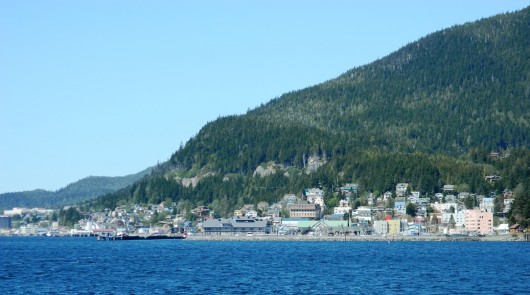 City of Ketchikan officials met with state Department of Environmental Conservation representatives about the city’s water supply and water treatment system. City Manager Karl Amylon reported Thursday to the Ketchikan City Council that the meeting was positive.
City of Ketchikan officials met with state Department of Environmental Conservation representatives about the city’s water supply and water treatment system. City Manager Karl Amylon reported Thursday to the Ketchikan City Council that the meeting was positive.
The City of Ketchikan has a couple of water issues that it’s working to resolve. First, Ketchikan Lakes, which is the source of the city’s drinking water, has more than allowed levels of coliform bacteria. The city hired consultants CH2M-Hill to look into why, and provide options for reducing those levels in the watershed.
Second, the city’s water supply has a lot of organic material floating in it, and when that material comes in contact with chlorine disinfection, it forms byproducts that are regulated by the EPA. The city’s water has too many of those byproducts, despite a new treatment system that brought the levels down, but not quite enough.
CH2M-Hill came up with a way to tweak the system, and hopefully get the byproducts below the threshold. That could cost up to $2.5 million.
Those two issues caught the attention of state regulators, who came to Ketchikan for a meeting with city officials. Karl Amylon said that meeting was very positive and encouraging.
“They understand the issues that we are dealing with,” he said. “They are by no means trying to have us immediately switch our focus to filtration. They don’t see that happening anytime in the near future.”
The city has been trying to avoid moving to a filtration plant, because building one would be expensive.
A conventional filtration plant would cost an estimated $35 million to build, and would be more costly to operate than the current treatment system. A membrane microfiltration system likely would cost less, but that is relatively new technology that the city hasn’t fully explored.
Amylon said the DEC officials had good things to say about Ketchikan, and the work that the city has done so far.
“They were very positive,” he said. “They were very high on Ketchikan and basically said that for the past 20 years, we’ve cooperated with the state and we were very high on their list as a community that has its act together.”
In other business, the City Council approved $20,000 for a public education campaign related to two bond propositions that will be on the Oct. 7th municipal ballot.
The bond propositions would authorize up to $10 million for various water and wastewater pipe replacement projects. The bonds would provide the local match for a state grant program that would pay 70 percent of the project costs.
At the end of the meeting, during Council Member comments, Marty West addressed a news item that has caused some recent controversy. The short news story on KRBD’s website reported that a local police officer was fined because his dog chased some chickens. The story didn’t name the chickens’ owner, but West identified the owner as Kevin Staples, who recently filed to run for Ketchikan City Council.
“I’m not interested in getting in the middle of dogs and chickens, but what does concern me is Mr. Staples is running for Council, and he has written some things on Facebook, that are really angry, really vitriolic,” she said. “It gives me some concern about how the police department is going to figure into the campaign as an issue and into the Council if Mr. Staples is elected.”
In a telephone interview after the Council meeting, Staples said he did write some comments on Facebook that he later regretted, and deleted. He said he has no negative feelings toward law enforcement officers.
“No. I have no hard feelings against the police force. Absolutely not,” he said. “They are here to serve the public, and that’s what I want to do.”
Staples is one of six candidates running for three seats on the Ketchikan City Council.
Also Thursday, the City Council established Oct. 4 as a tax-free day in Ketchikan, pending similar action by the Ketchikan Borough Assembly. That day was chosen because it’s the first Saturday following the scheduled day for the Alaska Permanent Fund Dividend direct deposit on Oct. 2.





